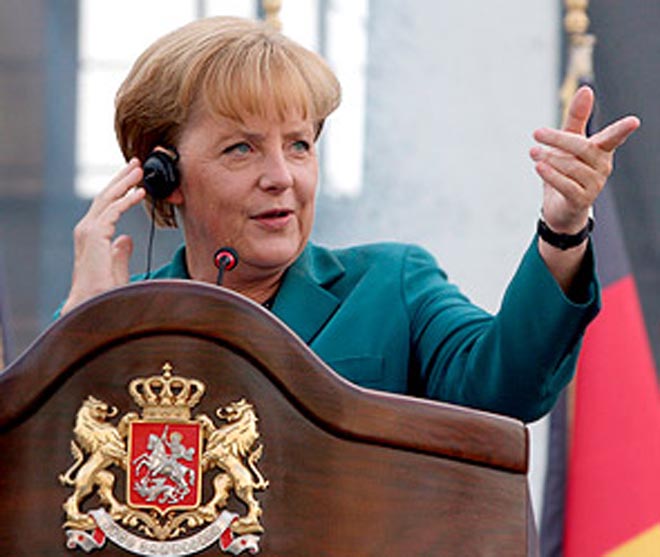Hans-Ulrich Beeskow still recalls the quiet determination of teenager Angela Kasner as she swept aside male rivals to reach the local, regional and then national math championships in communist East Germany, Reuters reported.
"Angela was very focused, very analytical, and took her time getting to a solution," said the 70-year old retired math teacher. "She was highly talented, an absolute exception, but not a student that stuck out and sought attention or accolades."
Four decades later, the same low-key drive that impressed her teachers at the Goethe Schule in Templin has helped turn the woman now known as Angela Merkel into one of the world's most influential leaders.
Merkel, 55, appears on track to win a second term as German chancellor on Sunday after four years of rule that have won her admirers at home and abroad, but also confounded some of Berlin's partners.
On the global political stage, where macho personalities like France's Nicolas Sarkozy, Italy's Silvio Berlusconi and Merkel's predecessor Gerhard Schroeder seem the norm, the shy Lutheran pastor's daughter has made her name with caution and control.
While many fellow leaders revel in the spotlight, their private lives often dominating the headlines, Merkel seems to view the attention that comes with her status as an unfortunate by-product, to be tolerated and contained.
Over the past four years, she has been more moderator than leader of her awkward "grand coalition" with the center-left Social Democrats (SPD), dashing early comparisons to hard-driving former British Prime Minister Margaret Thatcher.
When her counterparts in foreign capitals abroad rushed to announce ambitious measures to combat the financial crisis last year, Merkel resisted pressure for quick steps and bold speeches, taking her time to think things through before acting.
This go-slowly approach earned her accusations of weak leadership. In the heat of the crisis, French President Sarkozy famously jibed: "While France is working, Germany is thinking."
But Merkel's reserve has also turned her, against the odds, into one of Germany's most popular post-war chancellors -- polls show three in four Germans believe she is doing a good job -- and made her a reliable, go-to leader in Europe for heads of government outside the bloc.
"Merkel has brought a new style to politics after the machismo of Schroeder and others," said Juergen Falter, a political scientist at Mainz University.
Merkel was plucked from obscurity by former German Chancellor Helmut Kohl after the fall of the Berlin Wall, and became the youngest member of his cabinet in 1991 as minister for women and youth.
In her early years in politics Merkel, who still uses the name of her first husband, was seen as the token "Ossi," or easterner, of the first post-unification government. This led would-be rivals in her heavily Catholic, male-dominated conservative party to underestimate her.
"At first nobody took her seriously," Michael Glos, a veteran conservative who has known Merkel since the 1990s and served as German economy minister under her until February, told Reuters. "But it gradually became clear that she had both ability and ambition."
Colleagues say her leadership style owes much to Kohl himself, who was notorious for sitting out divisive policy debates until it was clear which way to lean -- a steadiness known in German as "Sitzfleisch."
But those who knew Merkel as a child believe her upbringing in the "DDR" also offers clues to her behavior as a politician and chancellor.
Growing up in Templin, a small town north of Berlin surrounded by rolling hills and picturesque lakes, Merkel and her family were viewed as suspect by the communist authorities because of her father's religious role.
As a result, she was forced to maintain a clear separation between her life at home and at school, where her parents urged young Angela and her siblings to keep a low profile.
Bodo Ihrke, who was in class with Merkel from the first grade through secondary school, says this experience shaped the cautious, controlled approach that she exhibits to this day.
"It does remind me of school days," said Ihrke, now a local Social Democrat (SPD) politician. "This controlled nature, it was and is her signature trait."
With the election looming, some in the media have speculated that Merkel's cautious leadership over the past four years, notably on the economic front, may be a product of her uneasy partnership with the SPD.
Last week's Economist magazine urged German voters to "set Angela free" from her grand coalition and back a center-right government that would allow her to fully exercise her leadership potential.
"The hope is that it is less her own nature that has stopped her from putting the case for more reform, than her imprisonment with her SPD partners," the magazine wrote in its lead article.
But those that know her well say it would be wrong to expect dramatic changes in the "small steps" approach she has used since 2005.
Even if she does seal a coalition with the business-friendly Free Democrats (FDP), she will not suddenly turn into a German version of Thatcher.
"Everyone has their own character, their own leadership style and that doesn't change," said a close adviser to Merkel, who requested anonymity.
"Would she be different in another coalition? I would say not. She is someone who prefers quiet to bold, who sees things in shades of grey, rather than black and white.
"You can see this as a weakness and accuse her of thinking too long, but it is who she is and it has proven effective."
Germany's Merkel turns caution to strength
Hans-Ulrich Beeskow still recalls the quiet determination of teenager Angela Kasner as she swept aside male rivals to reach the local, regional and then national math championships in communist East Germany, Reuters reported.






